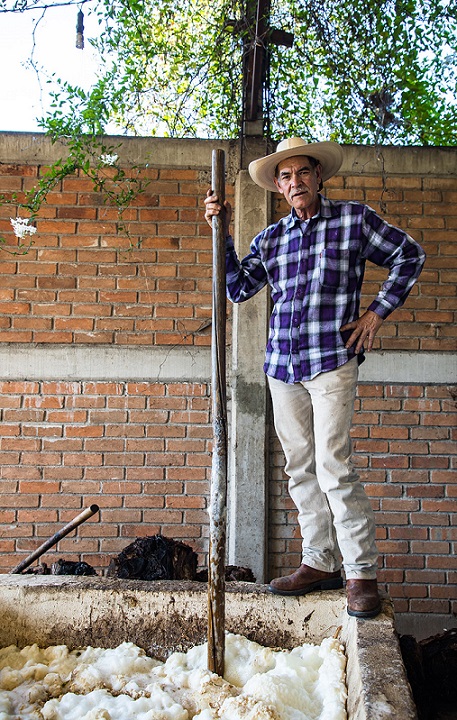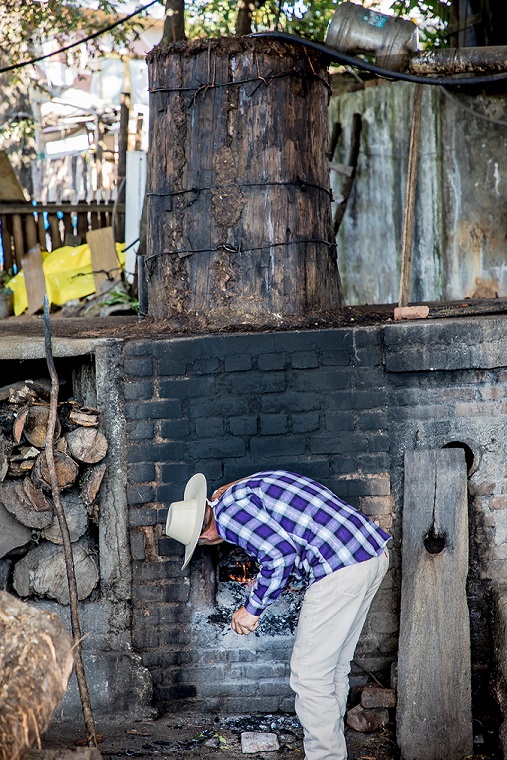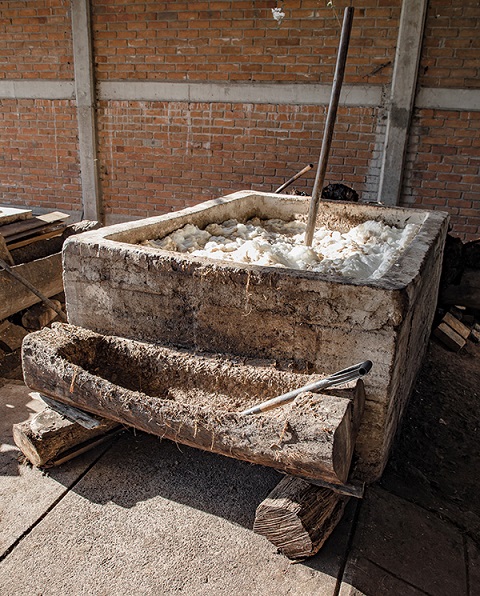Mezonte Supports Family Producers & Damn Good Mezcal
There’s something we’ve forgotten, something that has silently slid by us in our excitement and reverence for Mezcal and other agave distillates: family. Sure, the story of the plants, and how they were crafted into such a unique spirit, the history, and the mystique are all part of what makes drinking these spirits so interesting and so much fun. Even the mezcaleros and jimadores and all the others involved in the production are starting to gather their own claims to fame among the agave nerds. There’s one thing, though, that I feel doesn’t get enough attention yet it’s something that brings intangibility to this beloved category. With the popularity of these handcrafted spirits taking off, families are finding each other again. Children who have left home in order to help make a better life for themselves and their parents are starting to return to aid in managing the palenque. They’re learning the process and techniques that their ancestors used and are preserving a tradition. Of course, this isn’t the case for all producers, but Mezonte, among some other brands, are making these reunions all the more possible. Not only by paying fair and living wages to their producers, but also by supporting the infrastructure and investing in the future of the category and those who produce for them.
Founded by Pedro Jimenez Gurria in Guadalajara, Mexico, and now part of Suro imports (which also brings us amazing products like Don Mateo de la Sierra, Siembra Azul, Siembra Valles, and Siembra Metl), Mezonte is a non-governmental organization (NGO) that is dedicated to “protect and spread information about traditional mezcales through tastings, videos, texts, academic, biological, cultural, gastronomica aspects, conversations, etc…focused on promoting solely traditional mezcals, especially those from Jalisco and Michoacan.” You can visit Pedro’s bar, Pare de Sufrir, in Jalisco to try the full range of producers they support. Pedro and his assistant have made it their jobs to educate those interested on every aspect of the spirits they carry. He has cultivated close relationships and has garnered immense knowledge of the product due to the selective nature that Pedro stands by when partnering with a producer.
Pedro’s “bar,” Parre de Suffrir (Stop Suffering) is located in Guadalajara, Mexico and has been described to me as having a unique atmosphere, something that more closely resembles a shrine or Mecca than a bar. It seats no more than 15 people, and you can go in and try the range of spirits Pedro has hand-curated. A detailed description of what’s in front of you comes free with your selection as well as a clear love and respect for the spirit. People from all over gather and sit and share their stories and spirits in a simple space while listening to artists and DJs from Guadalajara’s progressive music scene.
One of the coolest aspects of this project is the transparency behind it. Although “under construction” at the time of this posting, Suro Imports has a section on their site that will show you where and how the purchases from the bottles are distributed among the producers. It’s something that is almost unheard of in any imported product. David was kind enough to send me the chart detailing the breakdown of the economics. This type of transparency is not only reassuring to us, the consumers, by letting us know how we’re helping to support our neighbors to the south, but it also helps to reassure the producers and gives them the knowledge necessary to be properly compensated for their backbreaking work. Sadly, there are brands that aren’t as fair to their producers as others but there’s not always a way for a producer to know exactly how they should be being compensated. With Mezonte’s transparency, producers know exactly where the sales from their labors are going.
Currently, there are three expressions being imported into the US, each made by a different producer. Raicilla Japo (Hildegardo Joya), Jalisco (Santos Juarez), and Tepe (Aciano Mendoza). Each product is special in its own way and all are being produced using underground cooking methods, natural fermentation, hand-crushing the piñas, and distilled in either Filipino style or clay pot stills. All is made with agave endemic to the region in which they are produced and are made in very small batches, ranging anywhere from 100 to 500 liters. Jalisco and Tepe are classified as “Agave Spirits,” (as they are not being produced in the D.O. for Mezcal), while Japo is classified as raicilla. The biggest difference you need to know about what makes raicilla different from mezcal is the region in which it’s produced. The denomination of origin is a whole ‘nother issue that warrants its own post. Basically, you can call mezcal mezcal if it’s produced in one of 9 states in Mexico; raicillas are essentially mezcals that come out of the state of Jalisco (yes, where a large majority of tequila is made). Pedro works with up to ten different producers, so we’re hoping to see more expressions coming down the line from Mezonte, but the three that are currently available are must-tries for those interested in agave spirits.
Raicilla Japo is an expression that David Suro feels is extremely special. It’s made by Hildegardo Joya, who at 75 years old still goes out into the agave fields with his machete to help harvest the Amarillo (Agave Rhodacantha) he uses to make his raicilla. It is made the hard way, cooked in underground ovens, crushed by hand, fermented with spring water and distilled using copper and parota wood stills. Sadly, Hildegardo’s family emigrated to the US long ago so definitely get this one while you can!
Santos Juárez is the man responsible for producing “Jalisco,” and exhibits the knowledge and passion that Pedro looks for in a producer. Santos cultivates 12 different varieties of agave, using the Alineño and Cimarrón varieties in the current release. He cares for his agaves almost like they’re his children. Growing in the fields for 12-25 years, Santos is able to discern the different species, ages, and characteristics, and also to explain why they’re planted in a certain way or proximate to a certain tree or other vegetation. Santos’ son, Ricardo, moved back to Toliman, Jalisco from Washington State where he was working with pears and apples in order to help his father produce for Mezonte.
While all three expressions are ridiculously tasty and exhibit the most labor-intensive and traditional techniques, the Tepe expression captured my heart and taste buds. Tepe is short for Tepehuano, which was described to me as being roughly translated to, “stone or rock people.” The Tepehuanos are a reclusive, native tribe that lives in the mountainous region of northern Jalisco. They are both culturally and geographically isolated and mainly produce raicilla for ceremonial or religious purposes; whatever they have left over is sold to Pedro. They use the Cenizo plant (Agave bovicornuta) and roast it underground before crushing the pinas with wooden mallets and fermenting them in compacted dirt pits lined with volcanic rocks. They use clay pots to distill the spirit and then they must travel to meet with Pedro as the natural geographical boundaries and “neighborhood,” (read: cartel) prevent him from being able to safely retrieve the spirits himself.
With the mezcal market slowly starting to gain traction, many are wondering if it will go the same way tequila did decades ago when brands like Sauza and Cuervo came on the scene. Big conglomerates did make tequila more accessible; however they were also a likely (maybe inadvertently) cause of creating a mono-crop of Blue Weber plants, which would be devastating to see in the mezcal world. Not only that, but the industry has shown how producers can get taken advantage of (read: Siete Leguas) by large corporations with in-house marketing teams and lawyers on retainer. Mezcal needs more brands like Mezonte who are not only highly selective of the producers they partner with, but also compensate those producers in a way that ensures it’s a profitable venture for the family moving forward. Brands that aren’t run by a board of directors, who aren’t trying to create a “luxury brand” by buying cheap juice and putting it in fancy packaging with a carefully curated set of artfully taken photos or an extraneously edited video clip. The next time you shop for a mezcal, do a little detective work and ask the brand, or the importer, how much they are paying their producers. If we want to continue to be able to imbibe such an expressive, unique, and beautiful spirit, we have to be willing to give back to the community and families that make it all possible.






